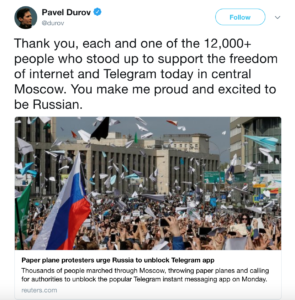Russia Tries to Ban Popular Messenger App
A Moscow court ruled in favor of the Russian Federal Service for Supervision of Communications, Information Technology, and Mass Media (Roskomnadzor) on April 13 in its lawsuit against Telegram, an instant messenger app founded by Pavel Durov. The ruling allowed Roskomnadzor to immediately begin blocking Telegram as punishment for its refusal to hand over its encryption keys to the Federal Security Service (FSB), which would allow the FSB to access all private messages exchanged by Telegram users. The FSB believes that terrorist groups inside Russia frequently use Telegram to communicate and seeks unlimited access to all user data to monitor terrorist cells and prevent future attacks. Meanwhile, Durov views the demand as a serious violation of the Russian citizens’ right to privacy, citing Article 23 of the Russian Constitution which stipulates a “right to secret correspondence,” and has so far refused to hand over the encryption keys or even participate in the trial.
Within days of the court ruling, Telegram’s popularity in Russia skyrocketed. According to TGStat, an online project that analyzes and publishes statistical data from over 10,000 Russian-language Telegram channels, the Telegram internet traffic on April 17—the day after the ruling was issued—was a record high that month. RBC reported that many Russian government officials, including deputies and senators of the State Duma (parliament), Kremlin officials, and several ministers continued to use Telegram channels after Roskomnadzor began blocking the site.
SimilarWeb ranks Telegram as the 15th most popular Android app in Russia, with WhatsApp and VK taking first and third place respectively. In 2017, Apple placed Telegram in the top 15 most popular apps in Russia’s Apple Store.
Pyotr (not his real name, as he wished to remain anonymous), a university student from Kazan, began using Telegram in 2014. He found the app to be user-friendly and used it primarily to communicate with his peers.
“I have stopped using it now because I am constantly experiencing connectivity problems when trying to connect to proxy servers,” Pyotr said.
The usage of proxy servers and VPNs has increased since the April ruling as Russians began searching for means to bypass the Roskomnadzor filters in order to continue using the app. Meduza, a Latvia-based, Russian-language news organization published an article titled “How Not To Feel Helpless When the Government Is At War With The Internet,” coaching its readers in setting up their own VPNs. Pyotr told the Caravel that he does not personally use a VPN.
On April 30, thousands in Moscow participated in a demonstration organized by the Libertarian Party and the Society for the Protection of the Internet (OZI) against the Telegram ban. The Moscow police reported the number of participants at 7,500, while a volunteer group, White Counter, estimated nearly 12,000 attendees. On April 29, Russian Telegram users received an invitation to attend the demonstration from the Telegram service team. Durov personally encouraged Russians to attend on VK, a Russian social media platform similar to Facebook that he also founded.
Pyotr explained that he does not participate in rallies or demonstrations. “Is that an effective way to combat the blocking [of Telegram]? In our country—no,” he said.
However, he made clear that he does not support the government’s blocking of the app. “I find what they’re doing to be a big mistake,” he said.
Roskomnadzor has recently demanded that foreign companies such as Apple and Google also block Telegram from their sites inside Russia. After an initial refusal, Apple has since partially complied, restricting iOS updates for the Telegram app globally, after Roskomnadzor issued an ultimatum threatening to take action against iOS services if Apple does not delete the app from the Apple store.
However, even as Roskomnadzor puts pressure on domestic and foreign companies to cut ties with Telegram, users continue to bypass the filters and use the app, exposing the federal censor’s inability to fully enforce its decision. Whether the authorities’ quest to eradicate Telegram (and terrorism with it) will produce concrete results or ultimately redirect user traffic to another encrypted messenger app remains to be seen.

